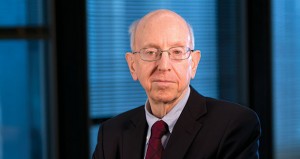7th Circuit affirms decision striking down gay marriage ban (UPDATE)
By: Eric Heisig//September 4, 2014//
7th Circuit affirms decision striking down gay marriage ban (UPDATE)
By: Eric Heisig//September 4, 2014//

The 7th U.S. Circuit Court of Appeals on Thursday upheld decisions by federal judges in Wisconsin and Indiana to strike down their respective state’s bans on same-sex marriage.
Judge Richard Posner, in an often scathing tone, wrote the unanimous decision in which he noted that “our pair of cases is rich in detail but ultimately straightforward to decide.”
According to the decision, “The challenged laws discriminate against a minority defined by an immutable characteristic, and the only rationale that the states put forth with any conviction – that same-sex couples and their children don’t need marriage because same-sex couples can’t produce children, intended or unintended, is so full of holes that it cannot be taken seriously.”
Posner also shot down the idea that marriage between a man and a woman needed to be protected because it is tradition, writing that “tradition per se has no positive or negative significance.”
In Wisconsin, same-sex marriage was banned by a constitutional amendment passed in 2006. Western District of Wisconsin Judge Barbara Crab struck that ban down in June. Shortly thereafter, after clerks of court started issuing marriage licenses to same-sex couples, Crabb stayed her decision. That stay remains in effect.
In a news release, the Wisconsin Attorney General’s office, which defended the state’s ban, said it would petition the U.S. Supreme Court to take the case. The release also reiterates that Crabb’s order is still in effect and that “the status quo has not changed with today’s ruling.”
A spokesman for the American Civil Liberties Union of Wisconsin, which is representing the plaintiffs, said it will hold a press conference later Thursday.
Thursday’s decision follows oral arguments in the case, which were held Aug. 26 in Chicago. The three-judge panel, with Posner mostly taking the lead, pressed those representing Wisconsin and Indiana for empirical reasons to uphold the bans, instead of relying on arguments based in tradition. The other judges on the panel were David Hamilton and Ann Claire Williams, appointees by President Barack Obama and Bill Clinton, respectively.
During the arguments, Posner – a Ronald Reagan appointee – repeatedly pressed the attorneys on the issue of adoption, as well as the fact that laws in both states allow cousins to marry if they are sterile or reach a certain age.
And his opinion – an uncharacteristically long one at 40 pages – dismissed all of Wisconsin’s arguments. He wrote that “there is little doubt that sexual orientation, the ground of the discrimination, is an immutable (and probably an innate, in the sense of in-born) characteristic rather than a choice.”
“Wisely, neither Indiana nor Wisconsin argues otherwise,” he continued.
Of Wisconsin’s argument that the state allows domestic partnerships, Posner wrote that the state had “thrown a crumb” to same-sex couples. He also criticized the argument that Wisconsin needed to “go slow” and collect data on how allowing same-sex couples to marry would affect the state.
According to the opinion:
“One would expect the state to have provided some evidence, some reason to believe, however speculative and tenuous, that allowing same-sex marriage will or may ‘transform’ marriage. At the oral argument the state’s lawyer conceded that he had no knowledge of any study underway to determine the possible effects on heterosexual marriage in Wisconsin of allowing same-sex marriage. He did say that same-sex marriage might somehow devalue marriage, thus making it less attractive to opposite-sex couples. But he quickly acknowledged that he hadn’t studied how same-sex marriage might harm marriage for heterosexuals and wasn’t prepared to argue the point.”
The 7th Circuit’s decision bumps the number of states where gay marriage will be legal from 19 to 21.
Though Wisconsin says it will appeal, there’s no guarantee that the U.S Supreme Court will take up the case.
County clerks in Milwaukee and Dane Counties said that despite the 7th Circuit’s decision, they cannot immediately start issuing marriage licenses. According to a release from Dane County Clerk Scott McDonell’s office, his office has to wait for the opinion’s final publication and a mandate to be issued.
The Associated Press also contributed to this report.
Legal News
- Former law enforcement praise state’s response brief in Steven Avery case
- Eric Toney announces re-election bid for Fond du Lac County District Attorney
- Former Wisconsin Democratic Rep. Peter Barca announces new bid for Congress
- Republicans file lawsuit challenging Evers’s partial vetoes to literacy bill
- More human remains believed those of missing woman wash up on Milwaukee Co. beach
- Vice President Harris returning to Wisconsin for third visit this year
- Wisconsin joins Feds, dozens of states to hold airlines accountable for bad behavior
- Trump ahead of Biden in new Marquette poll
- Bankruptcy court approves Milwaukee Marriott Downtown ‘business as usual’ motion
- New Crime Gun Intelligence Center to launch in Chicago
- Arrest warrant proposed for Minocqua Brewing owner who filed Lawsuit against Town of Minocqua
- Wisconsin Supreme Court justices question how much power Legislature should have
WLJ People
- Power 30 Personal Injury Attorneys – Russell Nicolet
- Power 30 Personal Injury Attorneys – Benjamin Nicolet
- Power 30 Personal Injury Attorneys – Dustin T. Woehl
- Power 30 Personal Injury Attorneys – Katherine Metzger
- Power 30 Personal Injury Attorneys – Joseph Ryan
- Power 30 Personal Injury Attorneys – James M. Ryan
- Power 30 Personal Injury Attorneys – Dana Wachs
- Power 30 Personal Injury Attorneys – Mark L. Thomsen
- Power 30 Personal Injury Attorneys – Matthew Lein
- Power 30 Personal Injury Attorneys – Jeffrey A. Pitman
- Power 30 Personal Injury Attorneys – William Pemberton
- Power 30 Personal Injury Attorneys – Howard S. Sicula











